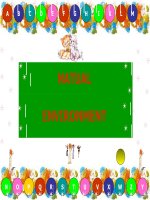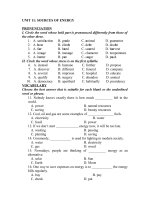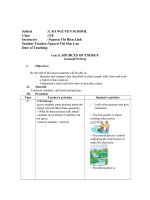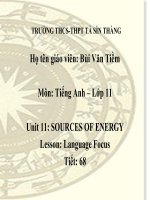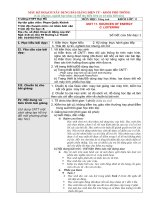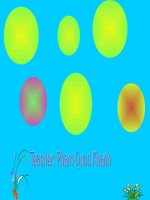Unit 10. Sources of energy
Bạn đang xem bản rút gọn của tài liệu. Xem và tải ngay bản đầy đủ của tài liệu tại đây (1.25 MB, 18 trang )
th
Monday, March 16 2015
Unit 10:
SOURCES OF ENERGY
GETTING STARTED
Vocabulary
carbon dioxide (n)
khí carbonic (CO2)
Carbon dioxide cause negativenegative
effects on
the
effects
environment.
ảnh hưởng tiêu cực
carbon footprint (n)
dấu chân cacbon
“Dấu chân carbon” là gì?
Tac đông cua ban đên môi trương manh đên cơ nao, nhưng hanh đông thương
nhât cua ban thai thêm vao khi quyên bao nhiêu khi carbonic (CO2); tất ca nhưng
sô liêu đo se đươc tnh toan đo lương va hiên thi băng môt con sô ma chung ta goi
la carbon footprint – dấu chân carbon. Con sô cua ban cang lơn thi tac đông xấu
cua ban đên môi trương cang manh, tưa như môt dấu chân không lô in lên bê măt
trai đất vây.
renewable (adj)
có thể tái tạo được
≠
non-renewable
không thể tái tạo được
renewable (adj)
có thể tái tạo được
≠
non-renewable
không thể tái tạo được
Vocabulary
•carbon dioxide (n) :
khí carbonic
• negative effect (n. phr.):
•carbon footprint (n):
•renewable (adj)
ảnh hưởng tiêu cực
dấu chân carbon
:
≠ •non-renewable (adj)
có thể tái tạo
:
không thể tái tạo
Match the words with their meanings:
1. carbon footprint (n) :
2. carbon dioxide (n)
3. renewable (adj)
ảnh hưởng xấu
:
có thể tái tạo
:
dấu chân carbon
4. non-renewable (adj) :
5. negative effect (n) :
không thể tái tạo
C02
Guess ?
What are they talking about?
Carbon footprint
Listen and read:
Mai: Nam, I read yesterday that we all have carbon footprint.
Nam: Well, we all have footprints- we make them with our feet.
Mai: Ha ha, I know that. But this kind of footprint is about the negative effect we have on the environment.
Nam: Right, it’s in the news a lot these days.
Mai: So our footprint is bigger when we use energy that produces carbon dioxide. That’s bad for the environment.
Nam: So it’s better to have a smaller footprint, right?
Mai: Right, Nam. Non-renewable energy sources like coal, natural gas, and oil produce a lot of carbon dioxide. Those sources are going
to run out soon too.
Nam: So, they are different to wind, hydro, and solar?
Mai: Yes, they’re all sources of energy too, but they’re renewable. That means we can’t use them all up – they will last forever.
Nam: Do you have a big carbon footprint, Mai?
Mai: Mine’s small. I recycle the products I use and I go everywhere by bike. We have solar panels on our roof at home to catch the sun’s
energy, too.
Nam: Oh no! I think my footprint is big, and not just because of these big shoes!
ANSWER THE QUESTIONS
1.What is carbon footprint?
2. What does ‘non-renewable energy’ mean?
3. Why is sunlight a renewable resource?
4. Why does Mai think she has a small carbon
footprint?
5. What things do you think might create a big
carbon footprint?
ANSWER:
1, It’s about the negative effects we have on the environment .
2, “ Non-renewable energy” means that it will run out if we use it up .
3, Sunlight is a renewable energy because we can’t use it all up or it will last forever .
4, Mai thinks she has a small carbon footprint because she recycles the products she uses
and she goes everywhere by bike.
5, The products that we use are bad for the environment or the energy that we use
produces carbon dioxide might create a big carbon footprint .
Complete the table below using information from the conversation:
Renewable
wind
Non-renewable
Ask and answer the questions about renewable and non-renewable
resources:
wind
coal
A: What type of energy source is wind ?
B: It’s a renewable source of energy .
A: What type of energy source is coal ?
B: It’s a non-renewable source of energy .
Solar energy
Fossil Fuel Oil
Coal
Biogas energy
Hydropower energy
Energy
Energy
Nuclear energy
Wind energy
Geothermal energy
Natural Gas
Thank you for your attention!
GOOD BYE

